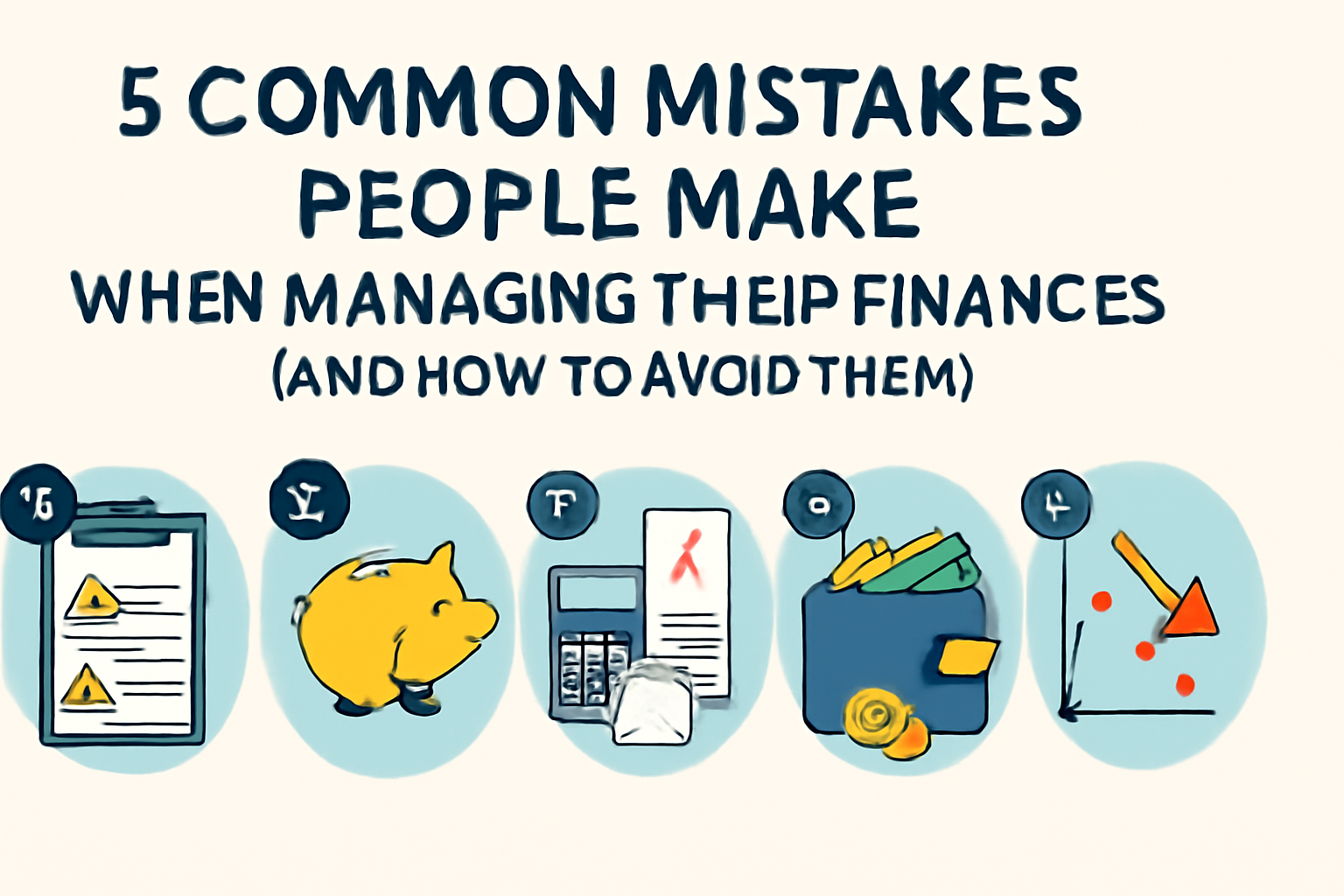Managing personal finances can be challenging, especially when you’re just starting out. Many people make common mistakes that can derail their financial goals, lead to debt, or cause unnecessary stress. The good news is that these mistakes are avoidable with a little bit of knowledge and careful planning. In this article, we’ll discuss the top 5 mistakes people make when managing their finances and offer practical tips to avoid them.
1. Not Having a Budget
One of the most common mistakes people make is not having a clear budget. Without a budget, it’s easy to lose track of where your money is going. This can lead to overspending, missed savings opportunities, and financial chaos.
How to Avoid This Mistake:
Creating a budget is the first step toward taking control of your finances. Start by tracking your income and expenses for at least a month. Then, categorize your expenses (such as rent, utilities, groceries, entertainment, and savings) and allocate specific amounts for each category. Use a simple budgeting method, like the 50/30/20 rule, or try a more detailed approach like zero-based budgeting, where you assign every dollar a job.
Once you have your budget in place, stick to it. Use budgeting apps like Mint or YNAB to track your spending and make adjustments as needed.
2. Ignoring Debt
Debt is a major obstacle to financial success, and many people make the mistake of ignoring it. Whether it’s credit card debt, student loans, or personal loans, the longer you leave your debt unchecked, the more interest it will accumulate, making it harder to pay off.
How to Avoid This Mistake:
The key to managing debt is to address it as soon as possible. Start by listing all your debts, including the total amount owed and the interest rates. Then, prioritize paying off high-interest debt first (the debt avalanche method) or pay off smaller debts to build momentum (the debt snowball method).
If you’re struggling with debt, consider consolidating or refinancing to lower your interest rates, or speak with a financial advisor for advice on the best debt-repayment strategies.
3. Not Saving for Emergencies
Many people make the mistake of not having an emergency fund. Without an emergency fund, you could end up relying on credit cards or loans to cover unexpected expenses, which can lead to further debt and financial strain. An emergency fund is essential for providing a cushion in case of medical bills, car repairs, job loss, or other unexpected events.
How to Avoid This Mistake:
Aim to save at least three to six months’ worth of living expenses in an emergency fund. Start small if necessary, and make regular contributions to your fund each month. Keep this money in a separate savings account to reduce the temptation to dip into it for non-emergencies.
Automate your savings by setting up a direct deposit from your paycheck to your emergency fund account, and make it a priority before spending money on non-essential items.
4. Living Beyond Your Means
Living beyond your means is a trap that many people fall into, especially when it comes to lifestyle inflation. As your income increases, it can be tempting to increase your spending on things like a new car, luxury items, or expensive vacations. However, this behavior can lead to financial strain and prevent you from achieving your savings or investment goals.
How to Avoid This Mistake:
To avoid living beyond your means, adopt a mindful approach to your spending. As your income grows, resist the urge to increase your lifestyle expenses too quickly. Instead, focus on saving and investing a portion of your increased income. Make sure to regularly review your spending habits and ensure they align with your financial goals.
Consider living below your means by prioritizing needs over wants, and be conscious of impulse spending. The more you can save and invest, the faster you’ll reach your long-term financial goals.
5. Failing to Plan for Retirement
Many people fail to plan for retirement, assuming that Social Security or other government programs will be enough to sustain them in their later years. However, relying solely on these programs is a mistake, as they are unlikely to provide the level of comfort you might expect.
How to Avoid This Mistake:
Start saving for retirement as early as possible. Take advantage of employer-sponsored retirement plans like a 401(k), especially if your employer offers a match. The more you contribute, the more you’ll benefit from compound interest over time.
If you don’t have access to a 401(k), consider opening an individual retirement account (IRA). The earlier you start saving, the more time your money has to grow.
In addition to retirement savings, make sure you’re aware of other retirement income streams, such as pensions or personal savings, and adjust your savings rate accordingly.
Conclusion: Take Action Now
By avoiding these common mistakes, you can set yourself up for a more secure financial future. Start by creating a budget, paying off debt, building an emergency fund, living within your means, and planning for retirement. The sooner you take action, the more likely you are to achieve your financial goals and secure your financial future.
Remember, managing your finances is a journey, not a destination. Stay consistent, educate yourself, and always make adjustments as needed to stay on track. With the right approach, you can achieve financial freedom and peace of mind.
